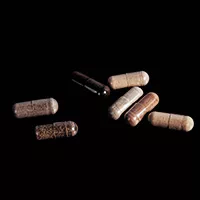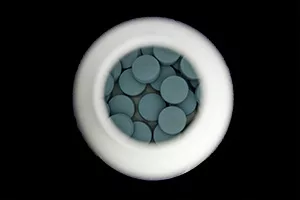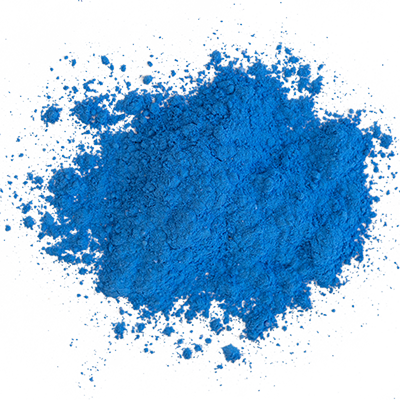Copper Bisglycinate
Fully-Reacted Chelated Mineral
Copper bisglycinate is a highly absorbable and bioavailable form of the mineral copper, making it the preferred way to supplement copper. ‡
Copper bisglycinate and copper glycinate represent the same mineral. Copper bisglycinate is the scientific or chemical name of this form of copper. ‡
Cypress Systems copper bisglycinate is a fully chelated mineral, making it more easily absorbed by the body. Fully reacted, chelated minerals do not dissasociate in the stomach’s acidic environment. They remain covalently bonded and can be properly absorbed and used by the body. ‡
Fully reacted mineral ingredients, including our copper bisglycinate are up to four times more bioavailable, with less inhibition by other minerals, and have fewer potential side effects. ‡
WHAT IS COPPER?
Copper is an essential mineral found throughout the body in small amounts, primarily in bones and muscles. 1
As a trace mineral, copper serves as a cofactor for enzymes, facilitating energy production for iron metabolism, connective tissue and red blood cell formation, collagen synthesis, and neurotransmitter production. 1, 2
Copper is essential for the health and maintenance of the immune and nervous systems, as well as for brain and gene development. 3
In general most people consume enough copper in their daily diet, however some people may be at risk of low copper levels:
People who take high doses of zinc supplements or use products, such as denture creams that contain zinc, may be at risk of a copper deficiency. Zinc limits copper absorption. People consuming zinc supplements and products should discuss copper supplementation with their healthcare practitioner. 1, 4 ‡
Those with absorption challenges may be at risk of low copper levels. 1, ‡
WHAT IS COPPER BISGLYCINATE?
Copper bisglycinate is made by binding bivalent copper with two glycine molecules. This ratio of copper to the amino acid glycine increase solubility, encouraging enhanced absorption in the small intestine and bloodstream. ‡
Fully reacted, chelated minerals like copper bisglycinate do not disassociate in the stomach’s acidic environment. Instead, this form of copper remains covalently bonded and properly absorbed and used by the body. ‡
Copper Bisglycinate
Research Data‡
Copper may have beneficial impacts on the absorption of iron, thereby potentially supporting hemoglobin and red blood cell production. ‡
Copper bisglycinate and copper are widely recognized for their positive health outcomes: 5, 6, 7 ‡
Recommended Daily Allowance of Copper
The recommended daily allowance (RDA) of Copper: 1 ‡
• Males and females aged 19 and older: 900 mcg
• Females aged 19 and older who are pregnant: 1,000 mcg
• Females aged 19 and older who are breast feeding: 1,300 mcg
Applications for Copper Bisglycinate

Supplement
Capsules

Nutritional
Gummies

Nutritional
Tablets

Functional
Foods &
Beverage
Benefits of Copper Bisglycinate
The benefits of copper bisglycinate may include: 1, 2, 3, 8, 9
- Production and development of red blood cells and hemoglobin ‡
- Positive for enzyme activation, enabling energy production and metabolism ‡
- Supports the body’s ability to absorb iron ‡
- Provides support for the growth and maintenance of the brain, heart, bones, connective tissues, and collagen ‡
- Provides nervous and immune system support ‡
- May act as an antioxidant, helping to limit free radical production ‡
Request Product Information
‡These statements have not been evaluated by the Food and Drug Administration. These products are not intended to diagnose, treat, cure or prevent any disease.
1 Copper: Fact Sheet for Health Professionals: National Institutes of Health (Accessed July 11, 2023) https://ods.od.nih.gov/factsheets/Copper-HealthProfessional/
2 Copper: Harvard T.H. Chan School of Public Health (Accessed July 11, 2023) https://www.hsph.harvard.edu/nutritionsource/copper/
3 Copper: Fact Sheet for Consumers: National Institutes of Health (Accessed July 11, 2023) https://ods.od.nih.gov/factsheets/Copper-Consumer/
4 Zinc: Mount Sinai (Accessed July 11, 2023) https://www.mountsinai.org/health-library/supplement/zinc
5 Disilvestro, Robert & Joseph, Elizabeth & Zhang, Wenyi & Raimo, Adrienne & Kim, Young. (2012). A randomized trial of copper supplementation effects on blood copper enzyme activities and parameters related to cardiovascular health. Metabolism: clinical and experimental. 61. 1242-6. 10.1016/j.metabol.2012.02.002. (Accessed July 11, 2023) https://www.researchgate.net/publication/221973562_A_randomized_trial_of_copper_supplementation_effects_on_blood_copper_enzyme_activities_and_parameters_related_to_cardiovascular_health
6 Impact of Copper Limitation on Expression and Function of Multicopper Oxidases (Ferroxidases): Joseph R. Prohaska. Department of Biochemistry and Molecular Biology, University of Minnesota Medical School. (Accessed July 11, 2023) https://advances.nutrition.org/article/S2161-8313(22)00568-3/pdf
7 Mahdavi-Roshan M, Ebrahimi M, Ebrahimi A. Clin Cases Miner Bone Metab. 2015 Jan-Apr;12(1):18-21. doi: 10.11138/ccmbm/2015.12.1.018. PMID: 26136790; PMCID: PMC4469220. (Accessed July 11, 2023) https://www.ncbi.nlm.nih.gov/pmc/articles/PMC4469220/
8 The Link Between Copper and Nutrition: Healthline.com (Accessed July 11, 2023) https://www.healthline.com/health/heavy-metal-good-for-you-copper
9 Health Benefits and Risks of Copper: MedicalNewsToday (Accessed July 11, 2023) https://www.medicalnewstoday.com/articles/288165
